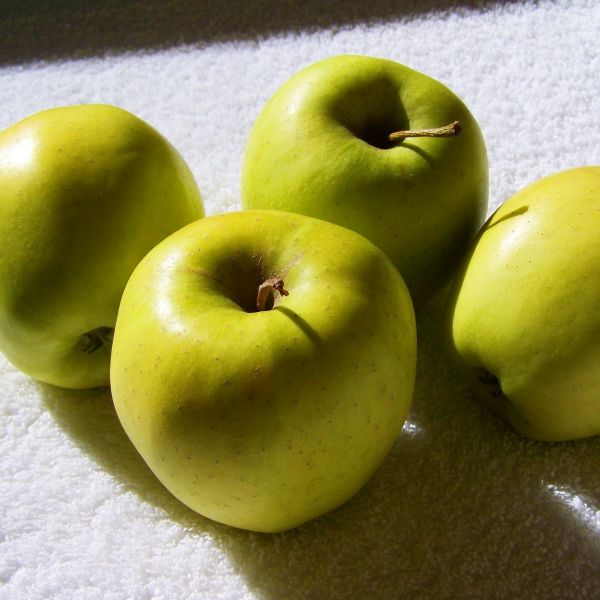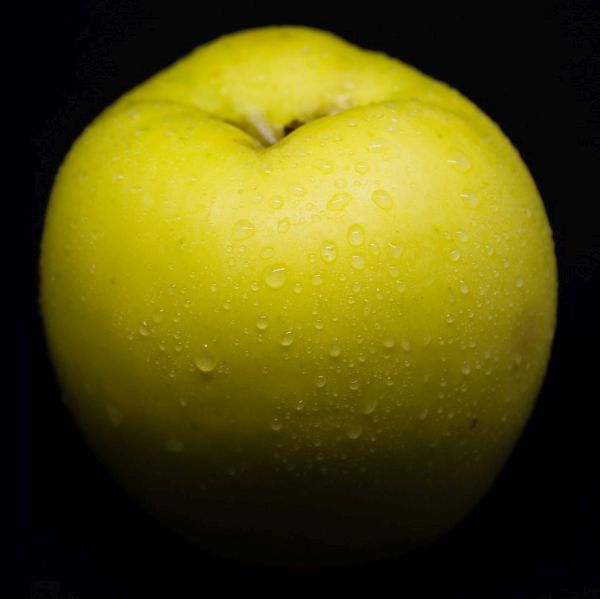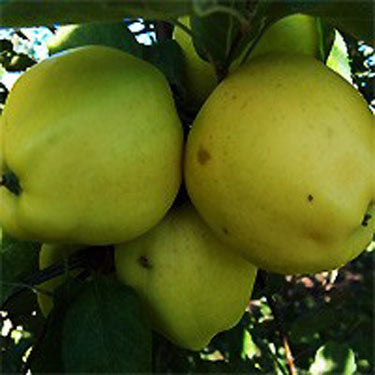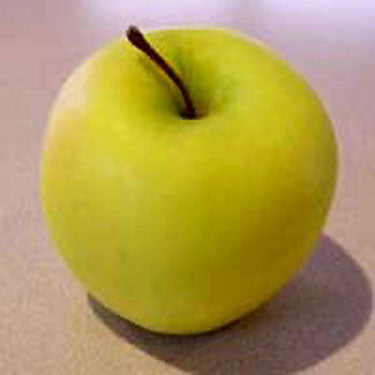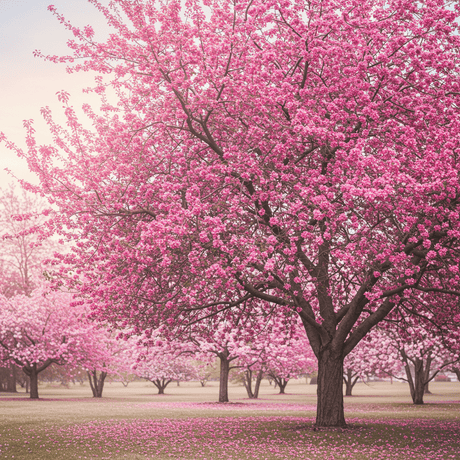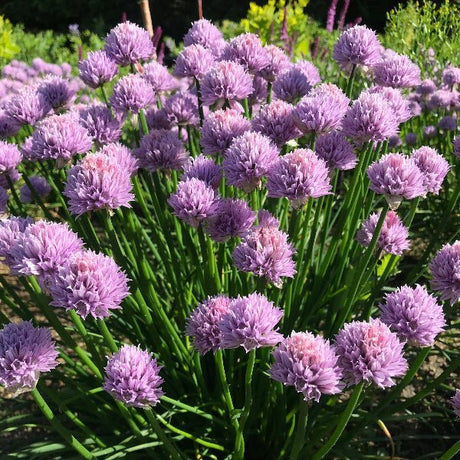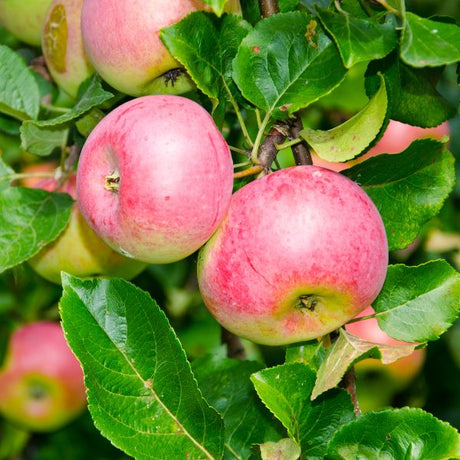Ginger Gold Apple Tree
Malus 'Ginger Gold'
- Stay Protected with Plant Sentry ™
Ginger Gold Apple Tree - #3 Container 3-4 Feet is backordered and will ship as soon as it is back in stock.
Plant Sentry™
Plant Sentry™

Plant Sentry™ Protected
Your order is protected by our compliance system that:
- Prevents restricted plants from shipping to your state
- Ensures plants meet your state's agricultural requirements
- Protects gardens from invasive pests and diseases
Delivery and Shipping
Delivery and Shipping
Delivery and Shipping
Fast, Safe Plant Delivery
Ships in 3-4 business days • Tracking provided • Weather protected
| Under $50 | $9.99 |
| $50 - $99.99 | $14.99 |
| $100 - $149.99 | $16.99 |
| $150 - $198.99 | $24.99 |
| $199+ | FREE |
✓ Zone-specific timing • ✓ Professional packaging • ✓ Health guarantee
Understanding Plant Options
Nature Hills offers plants in two main formats:
- Container Plants: Grown in pots with soil, sized by container volume and plant age
- Bare Root Plants: Dormant plants without soil, sized by height measurements
Container Plant Sizes
Container sizes indicate plant age and growing capacity rather than liquid volume equivalents. Our containers follow industry-standard nursery "trade gallon" specifications, which differ from standard liquid gallon measurements.
Young Plants (6 months to 18 months old)
| Container Size | Actual Volume | Metric Equivalent |
|---|---|---|
| 2" x 2" x 3" | 0.18 - 0.21 dry quarts | 0.20 - 0.23 dry liters |
| 4" Container | 0.31 - 0.87 dry quarts | 0.35 - 0.96 dry liters |
| 4.5" Container | 0.65 dry quarts | 0.72 dry liters |
| 6" Container | 1.4 dry quarts | 1.59 dry liters |
| 1 Quart | 1 dry quart | 1.1 dry liters |
| 5.5" Container | 1.89 dry quarts | 2.08 dry liters |
Established Plants (18 months to 2.5 years old)
| Container Size | Actual Volume | Metric Equivalent |
|---|---|---|
| 2 Quart | 2 dry quarts | 2.2 dry liters |
| #1 Container | 2.26 - 3.73 dry quarts | 2.49 - 4.11 dry liters |
| 5" x 5" x 12" | 3.5 - 4.3 dry quarts | 3.85 - 4.74 dry liters |
Mature Plants (2-4 years old)
| Container Size | Actual Volume | Metric Equivalent |
|---|---|---|
| #2 Container | 1.19 - 1.76 dry gallons | 5.24 - 7.75 dry liters |
| #3 Container | 2.15 - 2.76 dry gallons | 8.14 - 12.16 dry liters |
Large Plants (3-5 years old)
| Container Size | Actual Volume | Metric Equivalent |
|---|---|---|
| #5 Container | 2.92 - 4.62 dry gallons | 12.86 - 20.35 dry liters |
| #6 Container | 5.25 - 6.01 dry gallons | 23.12 - 26.42 dry liters |
| #7 Container | 5.98 - 6.53 dry gallons | 26.34 - 28.76 dry liters |
Bare Root Plants
Bare root plants are sold by height from the root system to the top of the plant. Plants may exceed minimum height requirements.
Common Sizes:
- Trees: 1 foot, 2 feet, 3 feet, 4 feet, 5 feet, 6 feet
- Shrubs & Perennials: 1 foot, 18 inches, 2 feet
Important Notes
Container Volume Specifications
- Trade Gallon Standard: Our containers follow industry-standard "trade gallon" specifications established by the American National Standards Institute (ANSI Z60.1) for nursery stock
- Volume Variations: Actual soil volume may vary due to plant root systems and growing medium settlement
- Age Indicators: Container size primarily indicates plant age and maturity rather than liquid volume equivalents
Growing Conditions
- Plant size can vary based on variety and growing conditions
- Container size helps indicate plant maturity and establishment level
- Larger containers generally mean more established root systems and faster landscape establishment
Seasonal Availability
- Bare root plants are available seasonally when dormant
- Container plants are available throughout the growing season
- Specific varieties may have limited availability in certain sizes
Questions?
For questions about specific plant sizes or availability, please contact our plant experts who can help you choose the right size for your landscape needs.
Plant Highlights
Ginger Gold Apple Tree highlights at a glance!
-
Botanical Name
-
Brand
-
Growing Zones5, 6, 7, 8, 9
-
Growth RateModerate
-
Mature Height
-
Mature Width
-
Leaf Color
-
Flower Color
-
Fall Color
-
Pollinator FriendlyYes
-
Pollinator Required
-
Bloom PeriodLate Spring
-
Harvest Time
-
FragrantYes
Characteristics
Where To Plant
When To Prune
- Late Winter
Water & Moisture Needs
- Moderate
Sunlight Needs
Soil Needs
- Widely Adaptable
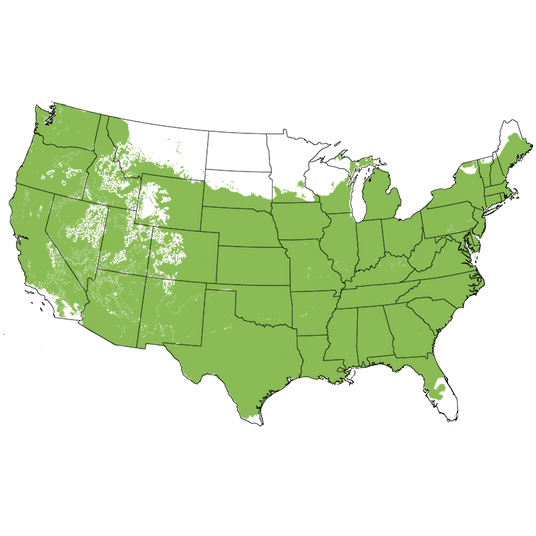
Growing Zones 5-9
Good as Gold - Early Ripening Ginger Gold Apple Tree!
- Pale Green Apples Mature to Golden Yellow
- Pinkish White Blossoms
- Pollinators Galore
- Early High-Quality Harvest
- Sweet Creamy White Flesh & Mildly Tart & Spicy
- Lush Foliage & Yellow Fall Color
- Stores Well & Gains Flavor
- Higher Yield with Pollinator
- 600-700 Chill Hours
- Crispy Perfect for Fresh Eating & Fruit Salad
- Excellent Dessert & Cooking Apple - Holds its Shape
Strike it rich with garden gold!
Ginger Gold Apple is an early-mid season ripening Apple with exemplary qualities. A new variety of Golden Delicious Apple, discovered in 1969 Ginger Gold Apple is a stand-out among other Apple varieties available today.
The most popular feature of your Ginger Gold Apple tree (Malus 'Ginger Gold') is of course the fruit it produces. In fact, Ginger Gold has become one of the most popular varieties of Apple in recent years.
Renowned for its early harvest and high quality, the Ginger Gold Apple is a lovely fruiting tree, beginning each spring with delicate white-pink blossoms. However, when your Ginger Gold truly shines is in early-mid August.
The large, conical Apples start a pale green, but ripen mid to late August, maturing to a lovely yellow-green, filling your tree's branches with golden-hued fruit.
The smooth, firm skin of your Ginger Gold will catch the afternoon light and draw you in for a taste of that sweet, creamy flesh with a touch of honey and spice. It's crisp texture makes this Apple a delight to bite into, the taste enhanced by the mildly tart essence that follows closely upon the initial sweet gush of flavor.
Your Ginger Gold Apple is delicious fresh, but also valued as a multi-purpose, cooking Apple because it holds its shape well when cooked. It also doesn't discolor as other Apples do when cut, so it will be terrific for all your fruit salads and other dishes that use Apples eaten fresh. It also keeps longer than other early-season Apples!
How to Use Ginger Gold Apple Tree In The Landscape
Plant one in an open area away from buildings, but where you can enjoy watching its progress toward each year's delicious harvest from bloom until autumn's fall color.
Vigorous and spreading trees, these smaller trees easily fit into all-sized gardens and orchards.
Fantastic for specimen plants and accent trees, the bloom display in spring makes these highly ornamental, perfect for front gardening and patio shade trees.
Charming cottage gardens and vegetable garden shade trees and accents, there's nothing as lovely as sitting beneath a blooming Apple tree.
Flowering fruit trees are dual-purpose plants for ornamental beauty and Edible Landscaping!
#ProPlantTips For Care
Preferring full sun for the most blooms and fruit, these hardy trees thrive in USDA growing zones 5-8.
Plant in average moisture with good drainage and organically enriched, fertile soil. A generous layer of mulch helps retain soil moisture as well as insulate the root system from heat and chill.
They are heat tolerant and relatively hardy, with good disease resistance. Be sure to prune when dormant in late winter to remove dead or troubled branches and to maintain an open canopy for airflow.
Ginger Gold Apple trees are smaller sized and can grow up to 15 feet in height.
You'll need a pollinator within 50 feet of your Ginger Gold, but it doesn't require much else from you.
For a beautiful tree with delicious fruit, you can't do much better than a Ginger Gold Apple! Order your garden gold from Nature Hills Nursery today!
Ginger Gold Apple Tree Frequently Asked Questions
When to Plant Ginger Gold Apple Trees
Planting Bareroot trees as soon as you can dig a hole in spring and until hot weather, the earlier the better. Plant container Apple trees throughout the growing season with complete success - that is the benefit of container plants - to extend the planting season. Your County Agricultural Extension Office is a great resource for first and last frost dates in your area.
How to Plant Ginger Gold Apple Trees
Dig a large hole only as deep as needed to accommodate the bareroot or container root ball, and twice as wide. Add Nature Hills Root Booster to speed root establishment. Remove the pot or bag and situate it into the hole so the top of the soil (soil line if bareroot), is level with the new location's soil being careful not to plant too deep. Water in again very well and backfill with the same soil you dug up, tamping down gently to ensure there are no air pockets.
Top off with a 3-4 inch thick layer of Arborist mulch. Consider staking your tree to keep its trunk growing straight for the first year to ensure it stands tall against strong winds and drifting snow.
When to Prune Ginger Gold Apple Trees
Trim off any broken branches from delivery as soon as you take them out of the box. Prune and trim Apple trees while dormant, in late winter or early spring, before you see new growth.
How to Prune Ginger Gold Apple Trees
Dormant prune to:
- Remove any double leaders or narrow crotch angles
- Eliminate any crossing branches
- Thin interior branching, leaving behind the fruiting spurs and strong branches in place opening up the canopy
- Branching at least 24-36 inches above the ground
Prune Apple trees in the summer to:
- Control size and shape by reducing the length of longer new growth on vigorous trees
- Remove water sprouts on the main trunk or older branches in the crown
- Remove suckers at the base of the trunk
- Thin fruit during heavy years on established trees
How to Care for Ginger Gold Apple Trees
Growing an Apple tree is easy when proper soil, good drainage, attention to moisture, and regular fertility are maintained. Once you've chosen an Apple tree that works for your climate, in the size you need for your landscape, and its pollinator (if needed), then you've accomplished half the battle!
- Apple trees do best in full sun and well-drained soil
- Water your Apple trees when they get dry - especially during the fruit production stage, and drought periods to keep them stress-free
- Use arborists' wood chips to mulch over the roots of your Apples and have your soil tested to see what your soil may be lacking before adding fertilizers
- Maintenance pruning and shaping
Apple trees will tolerate a wide range of soils, so long as water and nutrients are not limited and the pH level is adequate.
How to Fertilize Ginger Gold Apple Trees
For the first year, water alone is most important. It is always best to get a soil test to see what your soil is lacking before adding more fertilizers. Once established, a fertilizer routine may be beneficial. We do offer some excellent slow-release organic options, applied according to the package directions.
Fruit trees need more phosphate and it's possible to apply too much nitrogen which affects the soil's pH. Test soil acidity or alkalinity using a pH Tester.
Fertilize in spring when you first see new growth emerging.
- Don't overdo it
- Phosphates are your friends
- Pay attention to pH in areas with extremely high or low soil pH
- Follow the directions
Ginger Gold Apple Tree Pollinating Info
Ginger Gold is partially self-fruiting and doesn't absolutely need a pollinating partner, but will bear a lot more fruit when paired with these varieties:
- White Flowering Crabapples like Donald Wyman and Indian Magic Crabapples
- Cox's Orange Pippin
- Gala
- Granny Smith
- Honeycrisp
Harvest Times for Ginger Gold Apple Trees
Ginger Gold's are typically ready to harvest in August.
Early-Season? Mid-Season? Late-Season? The terminology can be confusing for new Apple tree growers. Weather, climate and your tree determine when it's ripe.
- Early-season is usually June-July
- Mid-season can be August-September
- Late-season can be from late September-November
The growing season consists of spring, summer, and fall, and varies with climate and weather. Areas with longer growing seasons in the warmer hardiness zones can greatly affect the harvest times for each particular Apple variety grown in your area. Learn which growing zone you are in.
What Shipping Options Do You Offer?
NatureHills.com works closely with our growers and nursery professionals to ensure we ship when it is most appropriate for your area. Our goal is to deliver the hardiest plants by avoiding extreme high and low temperatures. Check out our shipping schedule for more information and to learn our wills and won'ts when it comes to shipping plants. Find your Ginger Gold Apple Tree for sale here at NatureHills.com!

